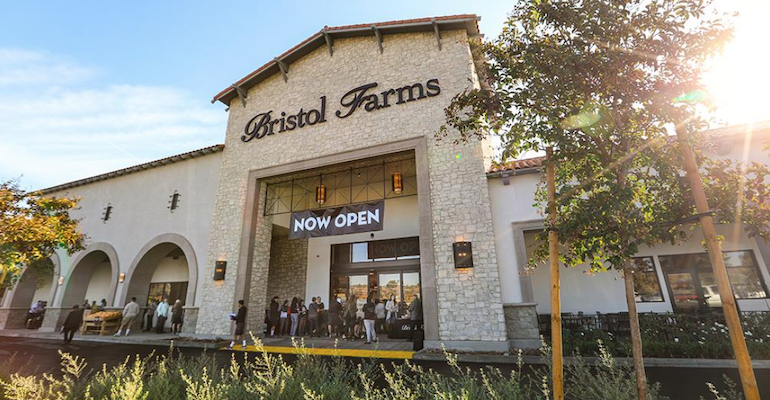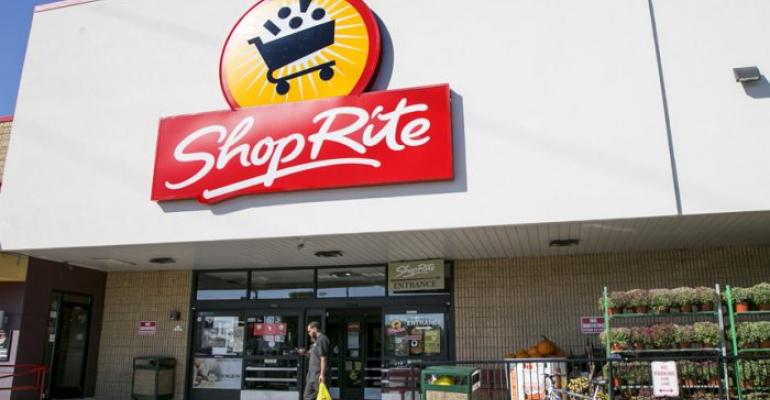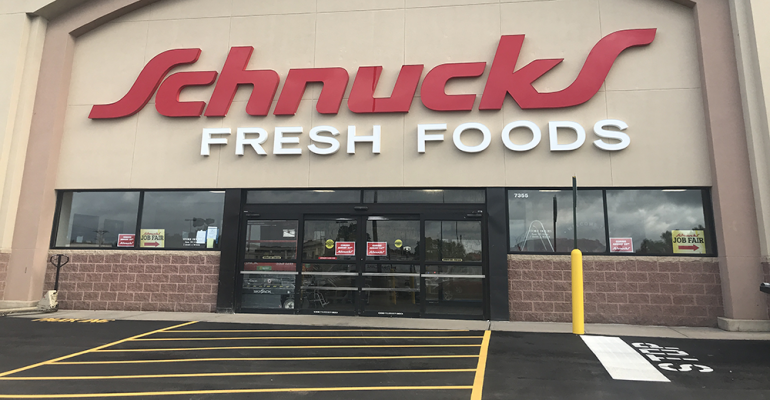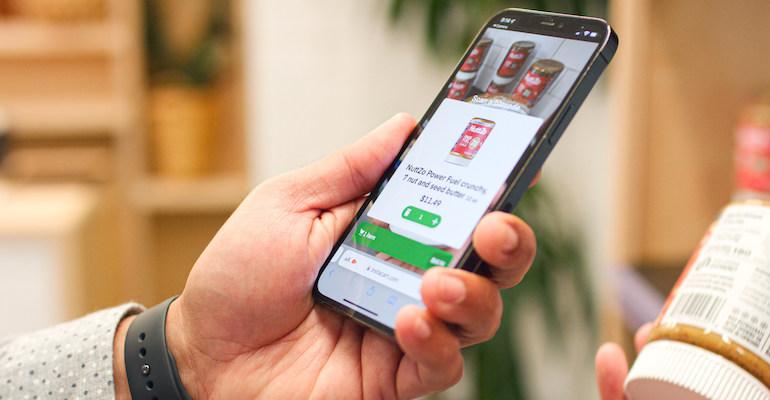Instacart is extending its value proposition for grocery retailers beyond same-day delivery with the launch of a full-fledged omnichannel solutions suite that joins online and in-store channels.
San Francisco-based Instacart on Monday unveiled Connected Stores, a bundle of six new Instacart Platform technologies that the company said will “bring together the best of online ordering and in-store shopping for consumers.” The modular package includes a smart shopping cart, mobile checkout technology, a digital shopping list tool, multifunction electronic shelf labels, a catering order management system, and real-time inventory management functionality.
For grocers, Connected Stores is designed to create a unified, personalized experience that enables shoppers to shift seamlessly between retailer apps, websites and brick-and-mortar stores, Instacart noted. The new solutions modules connect directly with current offerings under Instacart Platform, the enterprise-grade technology suite that Instacart launched in March.

Good Food Holdings' Bristol Farms banner will be the first to launch a full Instacart Connected Stores location.
Instacart Platform — whose solutions include e-commerce storefronts; online delivery and pickup for stores or warehouses; digital advertising; personalization to enhance the customer experience; and data tools for operational, customer and market insights — is aimed at helping grocers drive their digital transformations, according to Instacart CEO Fidji Simo.
“We believe the future of grocery won’t be about choosing between shopping online and in-store. Consumers are going to do both,” Simo said in a statement on Monday. “The launch of Connected Stores is another exciting step for Instacart as we partner with retailers to help invent the future of grocery. Through these technologies, we can now offer consumers the best of online shopping inside physical stores and vice versa. Ultimately, we believe that the more customers connect with grocers across both online and in-store experiences, the more retailers’ businesses will grow.”
Plans call for the first Instacart Platform-powered Connected Store to launch at a Bristol Farms supermarket in Irvine, Calif., in the coming months, Instacart said. Bristol Farms is part of Carson, Calif.-based Good Food Holdings, whose grocery retail banners also include Metropolitan Market, Lazy Acres Natural Market, New Seasons Market and New Leaf Community Markets in California, Washington and Oregon.
“We’re proud to provide our customers with a personalized shopping experience, whether they’re opting to build their baskets online or joining us in-store,” commented Good Food Holdings CEO Neil Stern. “As customers have adopted delivery and pickup over the past year, we’ve found it increasingly important to evolve our business with omnichannel customers at the forefront. As we look to the next decade of grocery, we want to make sure that we’re providing an inspirational shopping trip for our customers, and this starts by building a Connected Store.”

ShopRite parent Wakefern Food Corp. plans to introduce the Caper Cart smart shopping cart at stores.
Instacart’s roster of Connected Stores solutions includes the following:
• Upgraded Caper Cart: Instacart has unveiled a new version of the “smart” Caper Cart, which the company acquired last October. The artificial intelligence-powered shopping carts use scales, sensors, touchscreens and computer vision to provide a scanless, convenient experience for customers, allowing them to navigate the store more easily and check out without having to wait in line. The new Caper Cart model, Instacart reported, is slimmer and lighter than the previous version, sports 65% more capacity and offers stacked charging, enabling grocers to power up batches of carts at once rather than singly and eliminating the need to swap out batteries.
• Scan & Pay: Another “skip the checkout line” tool, Scan & Pay lets customers scan products as they shop and pay for them via their smartphones. The solution also can link items bought in-store to customers’ online shopping accounts for faster repeat purchases. For Supplemental Nutrition Assistance Program (SNAP) participants, Scan & Pay identifies products eligible for SNAP electronic benefits transfer (EBT) payment as soon as they are scanned.
• Lists: The Lists tool enables customers to scan a QR code to sync shopping lists from the Instacart App or a grocer’s Instacart-powered app or website directly to a Caper Cart. The cart then helps customers find their items in-store and automatically checks them off their list as they are put into the basket.
• Carrot Tags: Instacart said Carrot Tags brings to retailers using its platform electronic shelf labels that add functionality such as pick-to-light capabilities, which allow customers, store associates or personal shoppers to locate products more easily by choosing an item on their phone and flashing a light on its corresponding shelf tag. The Carrot Tags also display key information — such as whether a product is gluten-free, organic, kosher or SNAP EBT-eligible — and supports an ecosystem of electronic shelf label partners, including SES-imagotag’s VUSION retail IoT platform.
• FoodStorm Department Orders: Instacart acquired online catering order platform FoodStorm last October and integrated its order management system (OMS) into the Instacart App last month. The solution — which helps retailers manage orders for items such as baked goods, hot items, and deli sandwiches while customers are shopping — now features Department Orders functionality, which allows prepared foods departments within a store to work together to coordinate customer orders.
• Out of Stock Insights: An API, Out of Stock Insights gives store associates automatic, real-time alerts when items are running low or unavailable. Instacart said improved in-stock intelligence can help retailers avoid missed sales opportunities and provide a better experience to customers by minimizing out-of-stocks.

Schnuck Markets has deployed Carrot Tags electronic shelf labels to assist both customers and Instacart personal shoppers in its stores.
“In partnership with Instacart, we’re excited to introduce multiple ways to checkout with Caper Cart and Scan & Pay, while driving inspiration through Lists and Carrot Tags,” Good Food Holding’s Stern added. “Instacart is an innovator in grocery technology, and we’re thrilled to be their partner and debut the first-ever Connected Store at Bristol Farms this year.”
Instacart said the Connected Stores technologies can be layered atop its existing e-commerce solutions, such as Storefront Pro, already being used by grocery retailers. For example, Storefront Pro will power Bristol Farms’ online store and connect it to their physical store, which will leverage all six elements of Connected Stores. Modules of the omnichannel suite already have been piloted in the United States and Canada by grocers of all sizes, including ShopRite parent Wakefern Food Corp., Schnucks Markets and Joseph’s Classic Market, all of which are slated to soon be deploying elements of Connected Stores, Instacart reported.
“Technology is completely transforming the grocery industry, and working with Instacart is helping us unlock and adapt innovative solutions that will shape the in-store experience for our customers,” stated Cheryl Williams, chief information officer at Keasbey, N.J.-based Wakefern. “We’re excited to introduce Instacart’s newest Caper Cart in our stores and provide customers with a more personalized and seamless approach to the shopping and checkout experience.”
St. Louis-based Schnucks has deployed Carrot Tags to aid both customers and Instacart personal shoppers in its supermarkets.
“With Instacart's Carrot Tags technology, we’re able to seamlessly integrate electronic shelf labels and get them directly onto our shelves, helping Instacart shoppers track down hard-to-find products and making store navigation easier, allowing them to deliver excellent customer service,” according to Bob Hardester, chief information and supply chain officer at Schnucks. “We know successful online grocery requires blending technology and the human touch, and our partnership with Instacart helps ensure we’re meeting customer needs at all times while driving inspiration across our stores and online channels.”
A four-store, family-owned Italian specialty market on Florida’s east coast, Joseph’s Classic Market expects Instacart’s enhanced FoodStorm solution to help grow its catering business.
“Previously, we had to physically print out production logs to align and manage orders across departments which was a time-consuming and inefficient process,” explained John Acierno, owner of Boca Raton-based Joseph’s Classic Market. “Now with Instacart and FoodStorm’s technology powering Department Orders, we can be more collaborative as a team and better serve our customers by unlocking an easier way for people to order their favorite deli sandwiches.”
Connected Stores marks Instacart’s latest effort to boost its technology platform for retailers as the e-grocery giant moves ahead with an initial public offering. Over the past few years, Instacart quickly ramped up its ranks of personal shoppers, now exceeding 600,000, and its base of grocery partners, which now numbers more than 900 national, regional and local retailers in North America, providing online shopping, delivery and pickup from more than 75,000 stores in over 13,000 cities. Under CEO Simo, who succeeded found Apoorva Mehta, the company has shifted focus to building up its tech stack and bolster its standing as a retail enabler.
Besides the launch of Instacart Platform and the FoodStorm and Caper purchases, recent technology, solution and program additions by Instacart include the acquisitions of independent grocer e-commerce platform Rosie and AI-powered pricing and promotions platform Eversight; the launch of its Carts feature, which encourages users to orient their shopping habits around events or via existing carts curated by celebrities; the rollout of the Big & Bulky large-item delivery program; the nationwide expansion of online SNAP EBT capability; the launch of an upgraded subscription plan called Instacart+; and the introduction of the Cart Star three-tier personal shopper rewards program.
“In today’s competitive environment, grocers need a technology partner that can help them digitally transform in ways that reflect and augment their unique identities while delighting customers,” noted Jordan Speer, research director of product sourcing, fulfillment and sustainability at market intelligence firm IDC. “Omnichannel offerings such as Instacart’s modular Connected Stores create opportunities for grocers of all sizes to innovate in stores and offer seamless experiences across online and in-store.”





